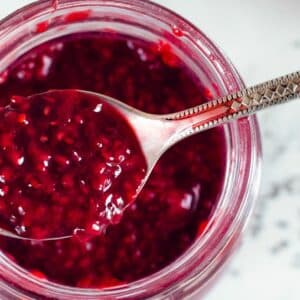Pomegranates are known for their bright red seeds and tart flavor. They are native to the Middle East and parts of Asia. We eat the seeds, also known as arils, which are considered a choking hazard for young babies. This pomegranate jam, a variation of my chia jam, is a great way to expose your child to the flavor of pomegranate while minimizing the risk of choking.
Pomegranates are often described as both sweet and tart. They can be eaten on their own or used in dishes such as salads, smoothies, and desserts. Due to their vibrant color, they are often used as garnishes.
This post may contain affiliate links and when you click on the links I may earn a small commission at no charge to you. As an Amazon affiliate, I earn a commission from qualifying purchases.
How to Serve Pomegranates to Baby
It’s usually recommended to wait until after 12 months to offer whole, raw pomegranate seeds to babies, due to the shape and texture of the seeds. You can flatten them or cook them prior to serving them to make them safer for your baby (1).
After around 12 months, you can begin to offer pomegranate seeds in their whole form. It’s usually best to start by offering them by themselves, because your child may not realize they are in a mixed dish and may not chew them. Once they get a bit older, you can serve them as you would eat them.
Pomegranate Nutrition
Like many fruits, pomegranates are a good source of vitamin C, making them a good addition to your child’s diet. Vitamin C can help your body absorb iron, which is a key nutrient for young children. They also have B vitamins, vitamin K, and zinc.
Pomegranates also contain fiber, which can help with constipation and other poop problems. They also have polyphenols which may have anti-inflammatory effects.
Buying Pomegranate
Look for a pomegranate that has firm, smooth skin. Avoid fruit that is soft, wrinkled, or bruised. It should be heavy for its size. This shows that it will be full of seeds.
Pomegranates can be light pink to deep red. Generally, the deeper the red, the more ripe the fruit. It should be slightly soft to the touch, but not squishy.
Pomegranates are in season from September to February, so they will be easiest to find during this time.
Storing Pomegranates
Pomegranates can be kept on the counter for about a week or in the refrigerator for about 2 weeks. If you want to freeze your pomegranate, remove the seeds and freeze them in a bag or storage container. They can last for up to 6 months.
How to Cut a Pomegranate
Many people recommend cutting the pomegranate in half and hitting it with a spoon, but I have personally never had much luck with that method.
Instead, I cut it into wedges and remove the seeds in a bowl of water. The juice stains, so removing in water helps prevent me from accidentally getting juice on myself. Also, the seeds sink and the white flesh floats making it easier to separate the two.
Pomegranate Berry Jam
Ingredients
- 1 cup pomegranate seeds
- 1 cup frozen berries
- 1 tbsp water
- 1 tbsp lemon juice
- 2 tbsp chia seeds
- 1 tbsp honey or maple syrup (optional: omit for babies)
Instructions
- Add fruit, lemon juice, and water to a medium pot. Bring to a boil.
- Reduce heat and let simmer 5-7 minutes. You want the fruit to be mostly broken down.
- Use an immersion blender or transfer to a blender and blend until smooth. For older kids or adults, you can leave some lumps, but for babies and younger kids, try to get it as smooth as possible.
- Add in chia seeds and sweetener, if using. Let sit around 10 minutes to thicken.
- Transfer to a mason jar or storage container and store in fridge.
Nutrition

Krystyn Parks is a Registered Dietitian and Lactation Consultant who specializes in feeding children. She has a Master’s Degree in Nutritional Science from California State University Long Beach. She is an International Board Certified Lactation Consultant and has been registered with the Commission on Dietetic Registration since 2013.

